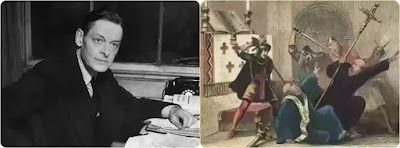Also Read
Thomas Becket has some resemblance to the ideal tragic hero as delineated by Aristotle. He has a shortcoming; however, the shortcoming does not cause his death. The tragic heroes of earlier tragedies "fall" because of an error of judgment or because of some character flaw but Thomas though imperfect at the, beginning of the play, achieves perfection of will before he dies. After all, the fact that Thomas is to be a saint calls for perfection. In Eliot's play the idea of Thomas suffering a "tragic death (in the sense that, say, Othello's is tragic) is nowhere entertained. The "murder" in the Cathedral is not a murder; it is an act of redemption. All thought of a fall-through-arrogance, all idea of a struggle at the character's level is accordingly bypassed and the dramatic effect is placed beyond all this in a context of religious redemption.
Thomas, though achieving perfection through the purification of motives, comes across as "human". There is a flash of humor as he tells the third Tempter: "Proceed straight forward". In his first encounter with the four Knights, we see him as a man facing men, rather than as a saint purifying his relation with God. In this way, though generally speaking, Thomas appears far removed from the petty affairs of ordinary humanity. Eliot has succeeded in retaining some links between him and the humans who observe the enacting of his fate, as Mason points out.
It is not possible or practical to compare Thomas to the tragic heroes of Shakespeare, such as Macbeth, Lear and others. As Mason says, "Shakespeare created his heroes to the greater glory of Man; Eliot to the greater glory of God." Murder in Cathedral is not a tragedy in the conventional sense. A.G. George calls it "Existential? drama"; it presents the mystery of suffering and action. The characters are of varying degrees of consciousness and they are presented with a situation in which they must make a choice. Thus Thomas has to choose, and the choice will determine his future. Thomas chooses not to go back to France; he chooses to affirm the rights of the Church; his choices lead to his martyrdom. His deliberate choice shows his greater level of spiritual awareness as compared to the Chorus, the Priests and the Knights. The drama lies in the interpretation made of the martyrdom by the Chorus, the Priests and the Knights. If the audience accepts the Knights' interpretation, the result would be tragic, according to Eliot, for mankind.
The tragedy of Becket is a continuing tragedy, for in every age a Christ must be crucified to atone for the sins of humanity. Murder in the Cathedral dramatizes Becket as a type of Christian hero conquering pride and attaining martyrdom. Thomas is an archetypal figure who wrestles with an archetypal problem, the subtle temptations of the. religious conscience when it has set itself up against the State.
On a superficial level, if we see martyrdom as mere death, then Thomas's decision can be seen as a foolish one - that is the Knights's interpretation. But a martyrdom, as Thomas explains in his sermon, is an act of redemption in which "rejoicing" and "pain" are fused. Through a martyr's death, mankind's life is fructified. In such context, one cannot call the play a tragedy in the conventional sense - it becomes a "Divine Comedy".
As far as Thomas is concerned, he is certainly not "active" in the conventional sense. But his courage and determination and supreme subjugation of self-will cannot be appreciated if one terms them "negative" qualities. He says:
Unbar the doors: Throw open the door:I will not have the hours of prayer, the church of Christ,The sanctuary turned into a fortress.The Church shall protect her own, in her own way.
The words do not appear to be "negative" or passive. They evidence a positive courage and faith which cannot but be admired. "His submitted will had the strength and resilience of steel", says Robert Speaight aptly. Indeed, the quiet courage of
I am here.No traitor to the king. I am priest A Christian....Ready to suffer with, my blood.................His blood given to buy my lifeMy blood given to pay for His deathMy death for His death. cannot fail to impress the audience.
Thomas Becket is not an Aristotelian tragic hero; nor is he like the Shakespearean tragic hero. He is a Christian figure, and it cannot be said that he is a "tragic" figure, for at the still point of the wheel, all contradictions and irreconcilables are reconciled. The tragedy lies in the fact that mankind still requires a martyr in every age to die and one for its sins; to die so that it can get salvation.
